Movie Review – Benedetta
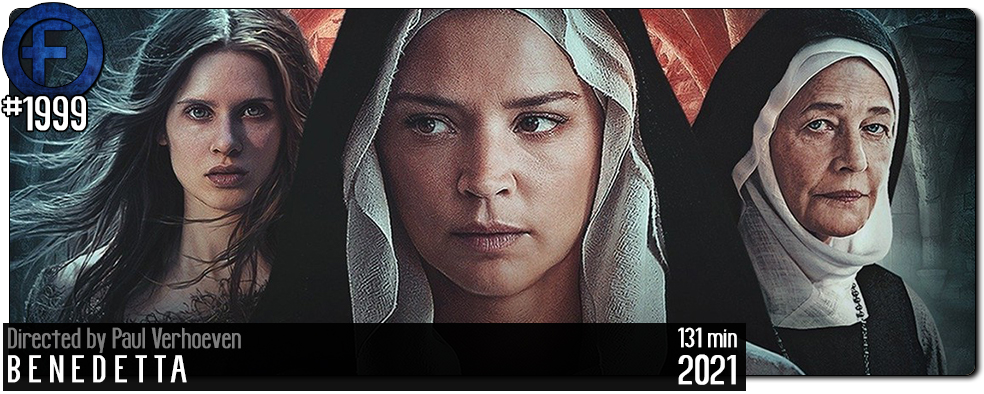
Principal Cast : Virginie Efira, Daphne Patakia, Charlotte Rampling, Lambert Wilson, Olivier Rabourdin, Clotilde Courau, David Clavel, Herve Pierre, Louise Chevillotte, Guilaine Londez.
Synopsis: A 17th-century nun in Italy suffers from disturbing religious and erotic visions. She is assisted by a companion, and the relationship between the two women develops into a romantic love affair.
********
Lesbian nuns. Paul Verhoeven. Controversial religious visuals. I mean, need I really say more? The director of such salacious cinematic delights as RoboCop, Basic Instinct and Starship Troopers involved with a real-life story of ambition and lust amidst the ravages of the plague in 17th century Italy, is almost too good to be true; Benedetta is an encapsulation of all the things that make Verhoeven such an enjoyable director to watch. He takes great story material and puts his definitive stamp of authority on it, a provocateur extraordinaire known for his confronting imagery and propensity for sex and violence, not to mention subtext casual viewers can often miss. With Benedetta, Verhoeven re-teams with Elle star Virginie Efira to tell a highly fictionalized and most definitely not for children recount of the real life Italian nun Benedetta Carlini, who lived in the first half of the 17th century and who was eventually imprisoned for fornicating with another woman, a novitiate named Bartolema. As salacious as that fact is, it pales into comparison with her reputed visions and stigmata, religious terms defining the recipient as holy and pure, even when the woman herself had questionable motives.
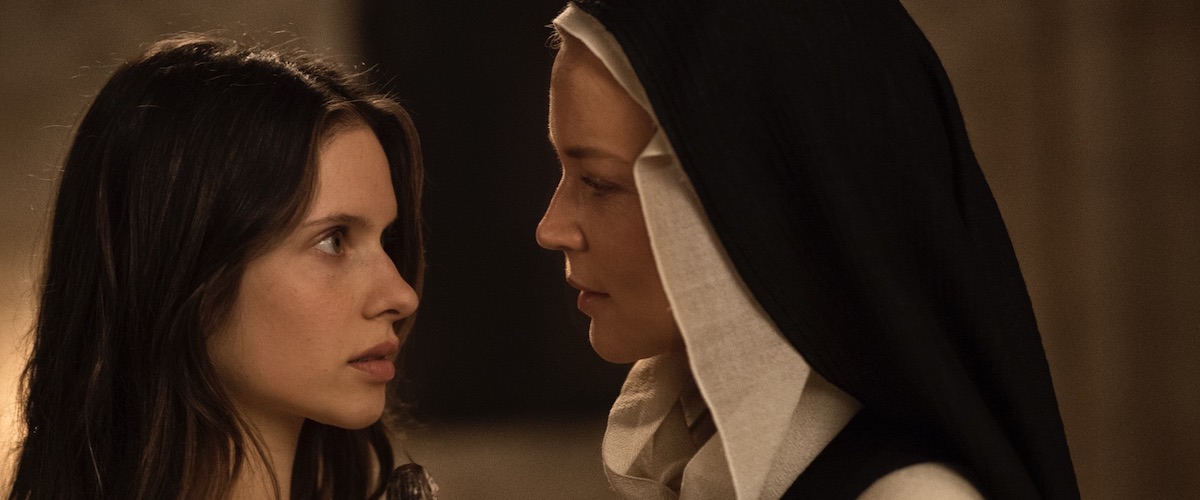
Taken to a convent in Tuscany as a child, nun Benedetta (Efira) grows into a holy and penitent woman. She is, however, the recipient of numerous visions, typically of Christ saving her from violent acts, and apparent stigmata – the sudden and profuse bleeding from wounds in either hands, feet or eyes – making her the cause celebre of the region. Benedetta’s stigmata is questioned by upright and powerful Abbess Felicita (Charlotte Rampling), when it appears as though the stigmata may be self-inflicted to influence the convent. As Benedetta’s mystical status grows, she encounters novitiate entry to the convent Bartolema (Daphne Patakia), with whom she forms a friendship and then a sexual relationship, of which she intends to keep a secret from the rest of the church. Felicita exhorts the local Nuncio (Lambert Wilson) to travel to the convent to see Benedetta for himself, much to the chagrin of the convent’s clergyman, Cecchi (Olivier Rabourdin); upon his arrival, he encounters the plague-ridden inhabitants of the town as well as witnesses an enormous comet in the heavens, a sign from God that perhaps Benedetta is indeed a holy child of God.
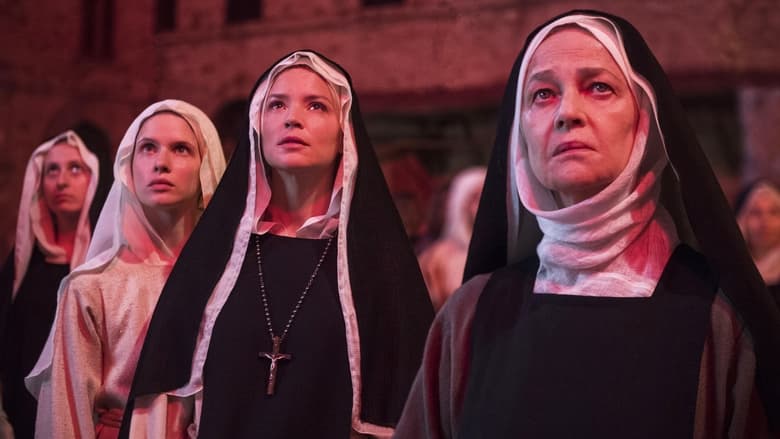
Sultry, sexy and fueled by the sanctimony of religious misogyny, Benedetta is a lurid story of lust and ambition set against the tumultuous middle ages and the church’s strident declarations of masculine power. Based on the book “Immodest acts: A Life of A Lesbian Nun in Renaissance Italy” by Judith C Brown, Verhoeven’s film is both preposterous and provocative, and undeniably entertaining. Brown herself even described the script thusly:
Paul Verhoeven and David Birke have written an imaginative and spellbinding script that explores the intersection of religion, sexuality, and human ambition in an age of plague and faith.
Indeed, Benedetta covers all manner of themes within its two hour runtime, hardly pausing for breath between battles, boobs and blood-soaked depictions of a heroic Jesus Christ not only upon the cross but also wielding a sword and hacking at snakes. The fanatically religious should approach this film with caution, if at all, and casual viewers will probably find themselves gasping at how much Verhoeven dares to vignette the hypocrisy of the church of the day, a church hung up on keeping women low and ensuring they held all the power. Patakia and Efira also spend a fair portion of the film nude or near-nude, including a quite sensual love scene that scorches as much as it titillates. Middle Ages sex has never looked so good, although it must be said for a bunch of nuns living in near poverty in the Italian countryside, I’d suggest the attractiveness of the real-world characters this film depicts would be substantially lower than what Benedetta promotes. At one point, both Benedetta and Bartolema grab handfuls of starched hay to wipe their delicate areas following a visit to the latrine; I’m not a woman, but this made even me wince. In any case, Benedetta is a film of such ribald intent you can only imagine the glee with which Verhoeven must have directed it.
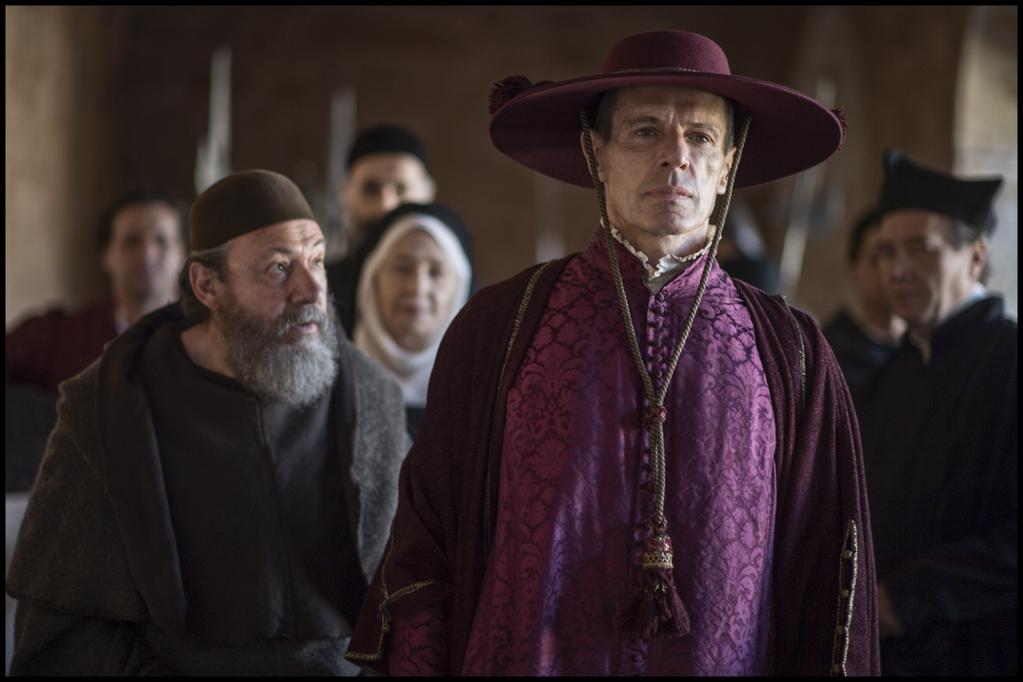
Of course, I won’t pretend to be an expert on 17th century Italian religious thinking, but it strikes me that the themes and iconography invoked in Benedetta’s scatological approach to power and faith is intentionally brutal. Verhoeven has never been noted for his restraint in subject matter, and objectively sets out to inflame or confront polarizing themes as best he can with the power of a camera: bravura performances aside, Benedetta is one of the more inflammatory takes on endemic prejudice within the Catholic church and I can’t help but applaud the director’s ballsy work. Verhoeven co-wrote the script with David Birke and they seem to have just gone as hard as possible to take the salacious elements of the real Benedetta’s life and ratchet their depiction up to eleven; again, I’m no expert but a quick reading of the research and available information on Benedetta Carlini indicates a lot of what transpires in the film is heavily fictionalized, even more than standard given the woman lived over four hundred years ago. As much as this story could have been far more nuanced and tactful with exploring Benedetta’s life, Verhoeven has taken a sledgehammer to the truth and, in capitalizing on our appetite for lesbians of any kind, thrusts the wantonness and elemental desires of the flesh to the forefront of this fatuous and at times celebratory masturbation effort.
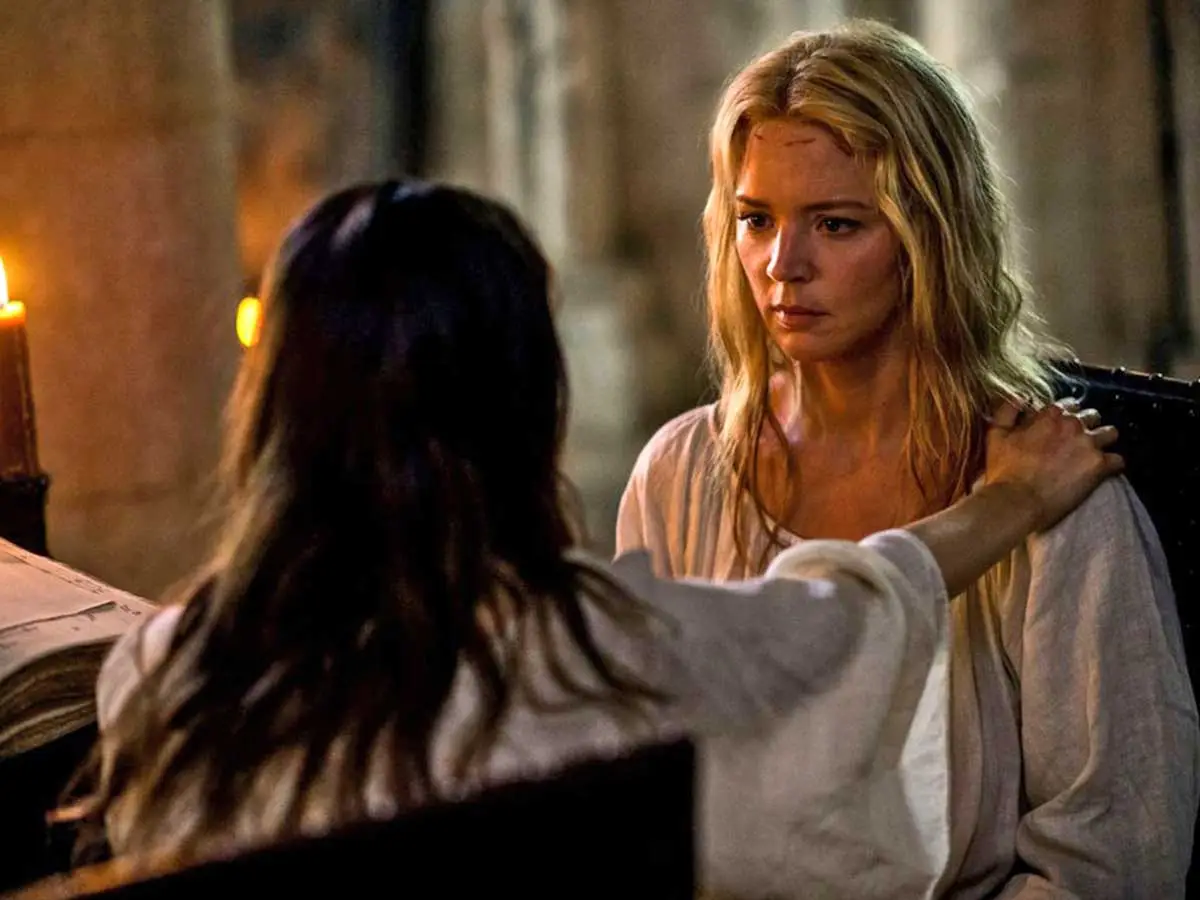
Leading from the front is the beautiful and committed Virginie Efira, and the stunning Daphne Patakia, the latter of whom I am now desperate to see in quite literally anything else. As a combination on screen they are incendiary, a blistering love-affair that’s burdened by having to hide for fear of public and personal costs, and Efira’s work as the possibly mad, possibly holy Benedetta is truly remarkable. The film doesn’t explicitly indicate whether it thinks Benedetta’s stigmata and visions were a scam, only alluding to it with a sense of mystery. Patakia is gloriously sexy in this, despite coming off as utterly mad – she makes the first move on Benedetta, who eventually reciprocates and gives in to her lust as the pair begin their power grab. Both Benedetta and Bartolema move to oust Rampling’s Felicita, and make the most of their newfound status when they achieve it. Charlotte Rampling is brilliantly cool, calm and collected as the senior nun of the convent, and her screen presence is a highlight of the movie. Getting to see Lambert Wilson in his native element, that of being a total asshole, is always fun, and Taken’s Olivier Rabourdin pops in as another church leader who tries to keep things on an even keel, despite his own misgivings. The rest of the supporting cast all work their best to aide this story’s vivacious pace and electrifying frisson, and coupled with the satisfying location photography and gloriously pompous production design, it all works superbly well.
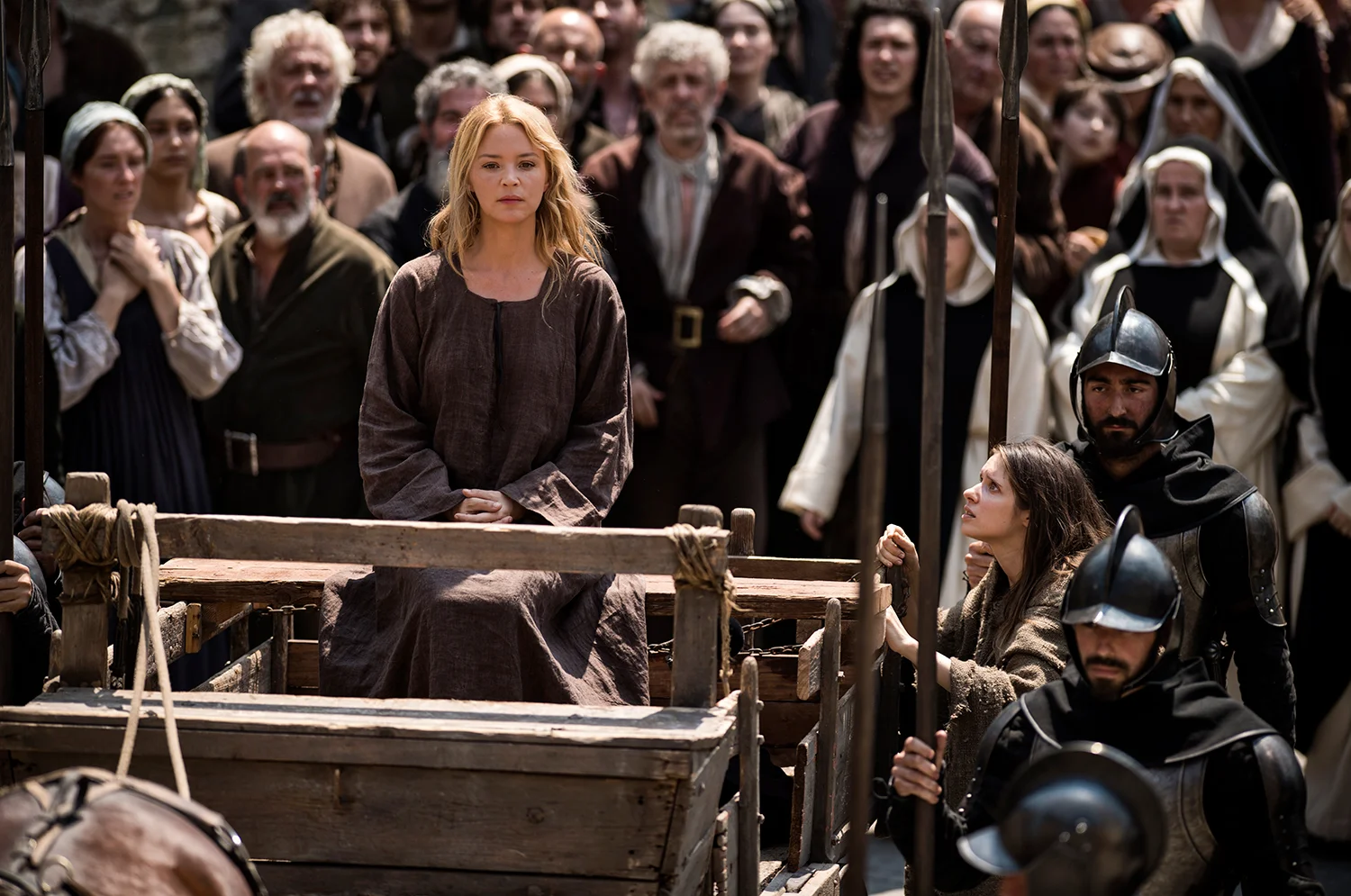
One of the film’s chief issues, however, is its refusal to conform to some kind of singular tone. The story is all over the place, the subject matter skipping between religious fervor, feminism and the male gaze, power and lust and a dollop of lesbian cream to keep the pagans interested. Verhoeven tries to inject so much subtext into his film it almost unbalances the whole thing, and most definitely makes for an uneven, listing ship of ideas set to run aground on rocks of confusion and contorted salaciousness. The characters within the film are flung into a variety of scenarios of which never quite seem to link with that which came before, almost as an ill-thought out dot-point presentation might stumble and weave around a central idea. As much as I delighted in Benedetta’s excesses, I did find this lack of coherence between scenes or ideas presented a touch discombobulating, and kept hoping (with futile result) that Verhoeven might bring it back some kind of organized central point. Benedetta feels like it’s flailing against conformity when it needn’t.

Benedetta is a film you’d describe as “an experience” and not be left wondering. Verhoeven has quite literally kitchen-sinked this story of lust and power and turned it into a medieval giallo of sorts, as lurid and tempting a flesh-fest as you’ll see. Benedetta is a smorgasbord of competing ideas and themes, vacuumed into this deliciously satirical skewering of church and religion (because they’re not the same) and presented with such ferocity and vigor you can’t help but be swept up by it.
